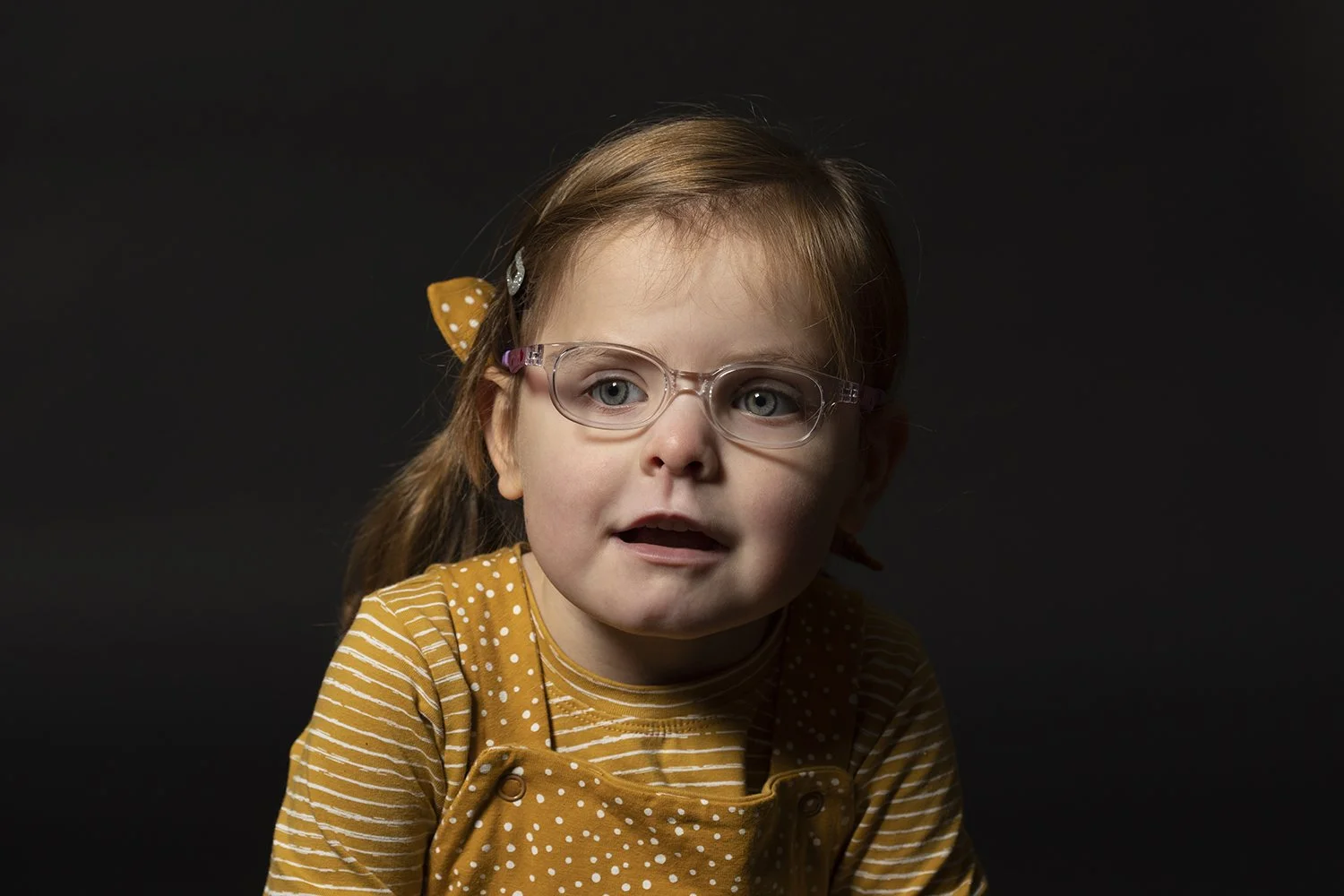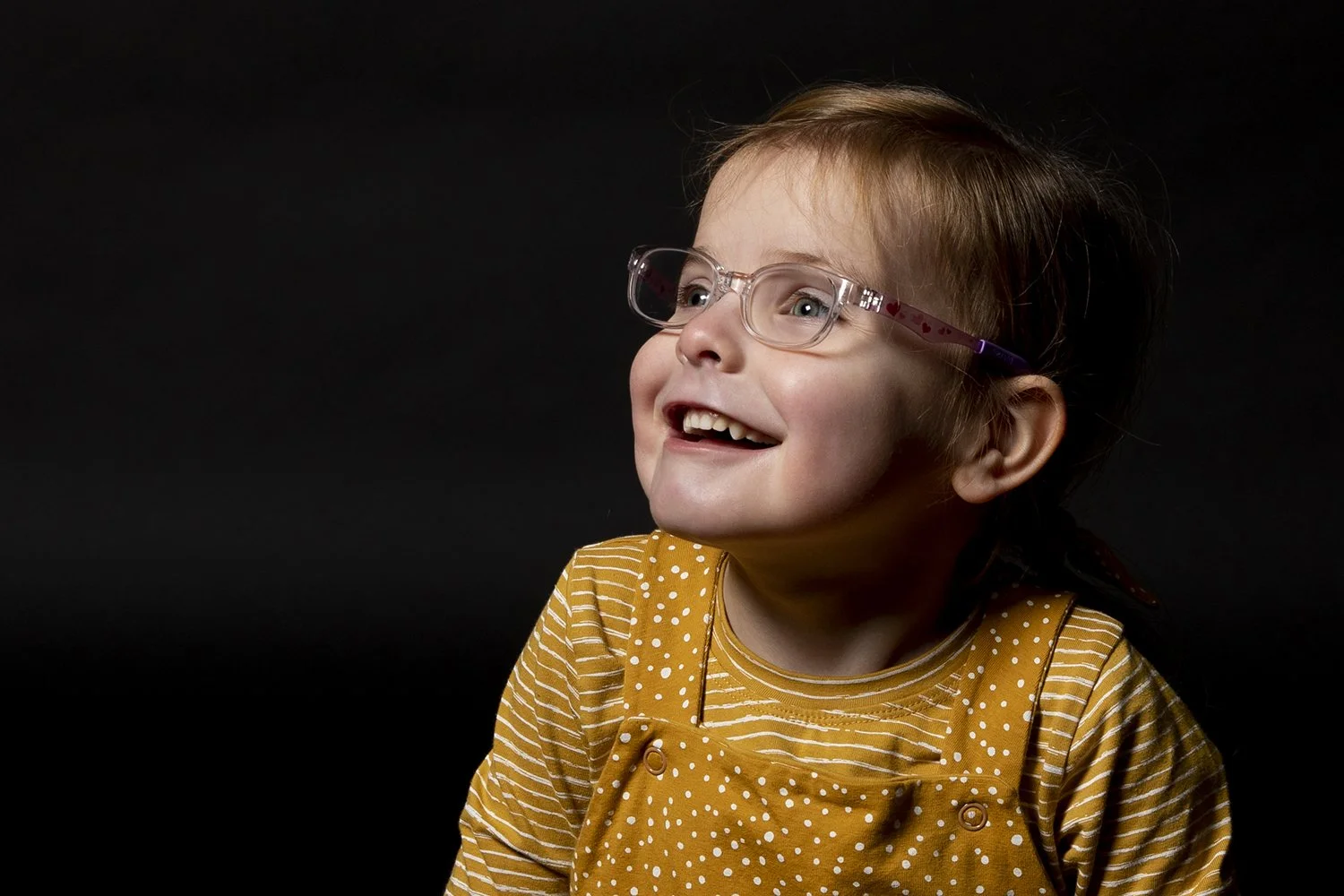LOIS
Lois smiling at the camera in her 2022 photoshoot - All photographs by Ceridwen Hughes
Stacy and Jonathan are parents to Lois, aged 5, whose condition makes her truly one of a kind. Lois has an ultra-rare condition 5q15-23.1 deletion. At the time of speaking to us, there is no one else diagnosed with this, although there are similar genetic profiles. “One of the genes with a similar deletion is known and it's called the APC gene, and that is linked to something called F.A.P (Familial adenomatous polyposis) which causes polyps to form in the bowel which if not treated turn cancerous. Quite often it is inherited, but not in her case it’s just part of her deletion.”
While Lois was in utero they knew after her 20-week scan that there was something wrong when they picked up a problem with her heart. After seeing the fetal cardiologist, they found out that her heart was missing the pulmonary valve and she had a small hole in the bottom two chambers. Due to this, her heart was enlarged, and the muscle wall got thicker, so the right chamber was quite small.
It was at this point that genetic issues were mentioned with a view of it being possibly caused by a few syndromes. Genetic testing at this point was offered.
“Because her prognosis was so poor, we didn't see the point in doing the genetic testing at that point. There was no benefit to doing it then because of the risk of the testing. Then they offered us a termination, saying if she is born, it'll likely be palliative care. We decided to go ahead with the pregnancy and look at testing when she was born, if it was needed at that point.” As pregnancy progressed Stacy was monitored closely with extra scans and when other complications arose, they were handled well. Each milestone in the pregnancy was passed and at 37+5 weeks Lois was born. At this point, blood was taken from her umbilical cord and sent off for genetic testing.
Lois has an Ultra-rare condition 5q15-23.1 deletion
“Our genetic results came back quickly; the letter was dated two weeks after her birth but it wasn’t until she was about 6 weeks old that we got the results. Lois was back in ICU with a Respiratory syncytial virus and the genetics team came and said she was not matched to any others on different genetic databases making her unique.”
Having no one else to compare her condition to causes difficulties when planning care. In addition to waiting for heart surgery, Stacy & Jonathan have been advised that she will need screening on her bowel from age 9 or 10. Alongside this, they have been told she will have learning disabilities, but it is unknown how her deletion will affect her as she grows. “Probably the most helpful thing we were given initially, was a guide from Unique. Whilst it was for children who had a deletion on 5q22 it has acted as a sort of guide as to things we might expect. On the whole though most of it has been kind of finding things out as we've gotten there.”
Lois’ care involves a considerable amount of communication, coordination and work for the family. They would very much like a more cohesive plan and improved communication between departments. “For instance, the community teams, like physio and speech therapy work on a different database to the hospital, so all those bits of information aren't shared. When you throw in school and other people it’s quite a complex picture.”
In addition to the coordination, it is difficult to know who to contact when Lois has an issue or is unwell. “There was a point where we were we were going to the GP fairly regularly. Each time we'd go they would do a bit of assessment and because they just don’t know how she is affected we would then be sent to the hospital. If she was a ‘typical child’ they might have been more confident in treating her. It got to the point where we thought actually maybe we should just bypass the doctor and go straight to hospital.”
The family receive support from CRDN and Unique Feet
Having to explain her condition is time-consuming and even the most knowledgeable of doctors and specialists can’t know every aspect of how it will and does affect her specifically. Not knowing how her condition will impact her in the long term causes much anxiety. “Lois has got a cleft palate, but they don't want to repair her palate until they can assess her speech, which they can’t do as she's non-verbal. We don’t know if she will speak in the future. We are kind of stuck in a loop. There are a few things like that with medical decisions and stuff where we think, well, we don't know how that's going to affect you in the future, so is it worth a risky operation? Making medical decisions can be quite hard.”
Awareness is important to them, more so now than ever. “I am very, very aware due to Lois being unique, that each person's story of having a rare disease or disability or is completely specific to them. It’s not just saying, ‘you've got this syndrome so it must be like this’ but, actually really valuing each person's uniqueness and their journey. Not having an easily identifiable condition definitely makes things more difficult.” Even some medical professionals that the family have come across during their journey have struggled with Lois’ diagnosis and how it affects her. This is understandable to the family due to the ultra-rare condition and there isn’t a benchmark but adds to the frustration.
They find some professionals assume how Lois should be because she has similarities to other syndromes, but this isn’t very helpful to the family.
“We celebrate all the small things. Lois is probably her own biggest fan and she likes to celebrate herself. She'll do something and then she will sit up and clap looking around the room waiting for one of us to join her. I think having any child is difficult. It’s still a whole new learning experience. We may be learning more stuff, certainly more medical things, but for us it's quite important to remember everyone has their own struggles.”
Lois attends mainstream school and is adapting to school life well with 1-to-1 support in place. There are obstacles just like for any child adapting to school. Her parents are watching her friendships blossom and she is learning Makaton to help communicate. This is something her teachers and other pupils are also doing. This can only ever be a positive thing, that the children are learning about differences and acceptance from a young age “and hopefully they will grow up with a bit more awareness. Hopefully, they ask questions, and the teachers can help them understand difference.”
Lois’ care involves a considerable amount of communication, coordination and work for the family
Support for the family comes from CRDN, Unique Feet and up until she started school a small playgroup for preschool children with special needs. Lois attended the group from about 8 months old. “That was really nice. It was quite a small group, maybe five families or so. We'd have a cup of tea and talk with the other families. That was probably the only point in the week, we actually had any respite.”
Since her diagnosis, her parents are learning a lot through her. It has strengthened their relationship and they say everything they do is as a team, leaning on the strengths of the other. “I think the most positive thing for me has been Lois has just taught me so much. I've learned so much about the world. Seeing it from her perspective, she’s made me see the world differently and made me probably more of a reflective and critical thinker. I think one of the hardest things is working out what's going on for her. What's happening? How do we help that? She's very rarely upset or angry. If she is, it’s not just your typical temper tantrum she will be like that for a reason.”
“Lois sees the world differently and she's just smiling and happy and content with simple things. Which makes you realise that we should enjoy the simple things in life too.”
FIND OUT MORE
UNIQUE
Unique provides support, information and networking to families affected by rare chromosome and gene disorders.
Their helpline can help you understand your family member’s diagnosis and connect you with others.
To find out more about Unique and how they can support you, click here.
Source: https://www.rarechromo.org
Cambridge Rare Disease Network
Cambridge Rare Disease Network is a platform for change. It is the infrastructure that unites patients, advocates, experts and leaders to address the challenges faced by people affected by rare diseases. By sharing knowledge and experience, and working together, the journey towards better diagnosis, treatment and support for patients and their families is smoother and more certain.
To find out more about Cambridge Rare Disease Network and how they can support you, click here.
Source: https://www.camraredisease.org
UNIQUE FEET
Unique Feet brings together kids and families who understand each other’s shared challenges and difficulties but who also know how important it is to celebrate their achievements.
Often that understanding enables the UF ‘gang’ to raise one another up to help achieve hopes and dreams that might be so much more difficult to achieve alone.
To find out more about Unique Feet and how they can support you, click here.
Read the Impact Report and hear from families about what this community means to them here.
You can read about some of the other people taking part in the Rare Project by clicking here.
Don't forget to visit and 'Like' our Facebook page too so we can keep you up to date with our new rare stories by clicking here.





